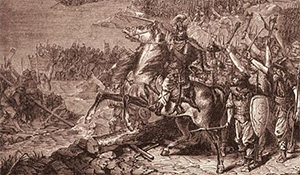Charlemagne
Part 1: Rise to Power Charlemagne was one of the most famous figures of the first millennium in Europe. A successful warrior and leader, he ruled over a land nearly as large as the Roman Empire. 
He was born in 742 near Liége, in what is now Belgium. (Some sources say that he was born at Aachen, the site of his later capital.) His father was Pepin the Short, a Frankish noble. That king's father was the famous Charles Martel, who had led the Franks to victory at the Battle of Tours 10 years before Charles was born. Little is known of Charles's childhood. As an adult, he knew Greek and Latin. Pepin was Mayor of the Palace, a position that had, during the reigns of the later Merovingian kings, come to be the power behind the throne. In 751, when Charles was 9, his father dispensed with the fiction and named himself King of the Franks. He had the support of the pope to do this. Pepin the Short died in 768, and his two sons, Charles and Carloman, succeeded him. Seeing two new rulers, the province of Aquitaine, which Pepin had taken over only in 769, rebelled. Charles and Carloman disagreed on how to respond, and Charles led an army to Aquitaine and took it back. In 770, Charles married Desiderata, daughter of the Lombard king Desiderius. Less than a year later, he decided that he wanted to marry someone else and so sent Desiderata away. He later married Hildegard, daughter of a German count; during their 12 years of marriage, they had six children together. Desiderius wasn't all that happy about Charles's refusing to continue to be married to his daughter and appealed to Carloman to do something about it. What appeared to be the start of a civil war was ended by Carloman's death, at the end of 771; historians generally believe that he died of natural causes. 
Charlemagne earned his famous name (meaning "Charles the Great") by conquering most of Italy and most of Germany, creating an empire the likes of which hadn't been seen in Europe in a few centuries. Pepin and his descendants came to be known as the Carolingian Dynasty, named for Charles Martel. Charlemagne was an expert strategist and in-the-moment thinker on the battlefield. He and his Frankish army made particular use of horses in order to transport themselves from place to place. He also championed the use of technological advances in warfare, particularly siege weapons. As a result, he had many successes. Next page > War and Consolidation > Page 1, 2, 3 |
|
Social Studies for Kids
copyright 2002–2024
David White




